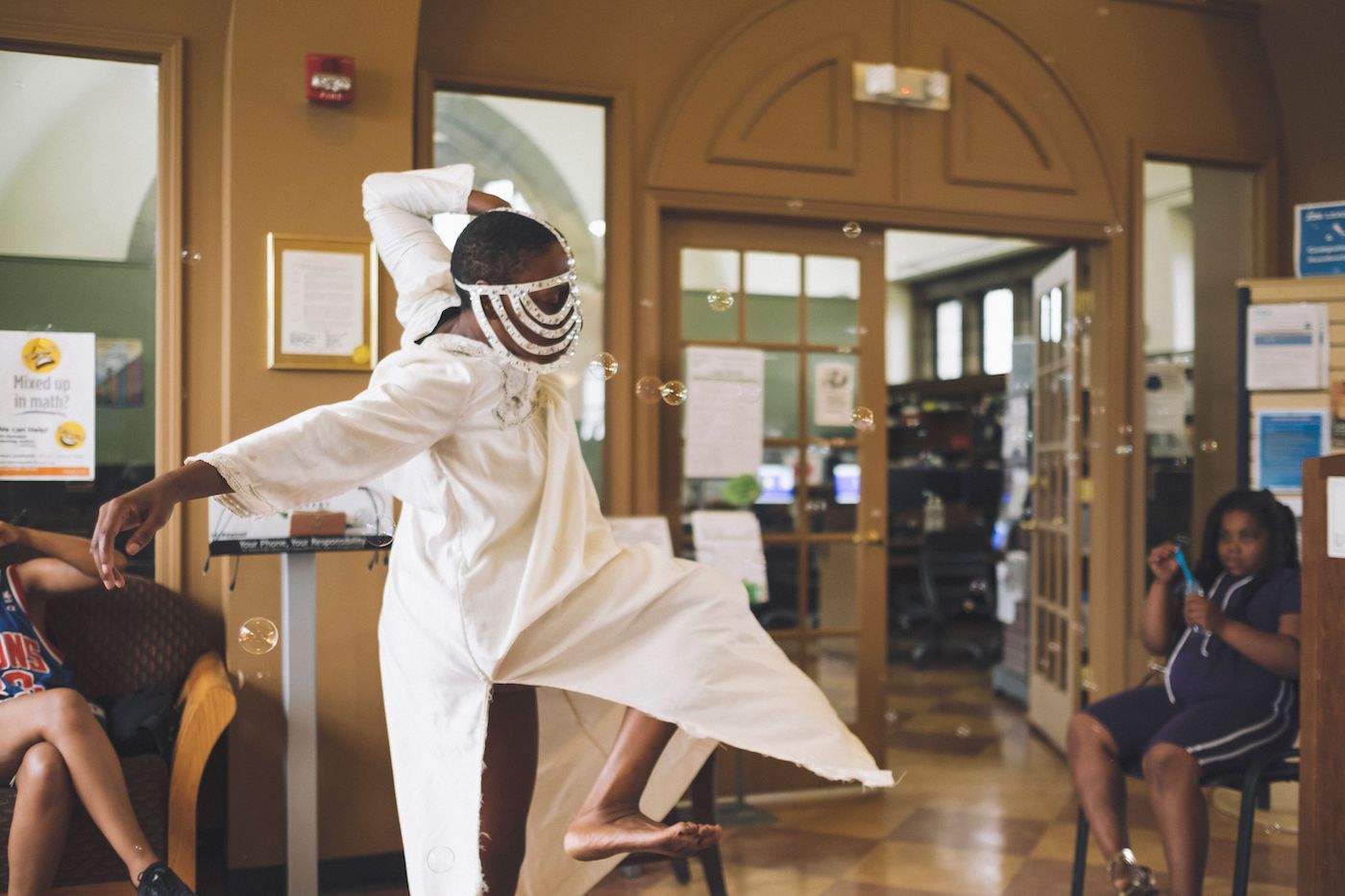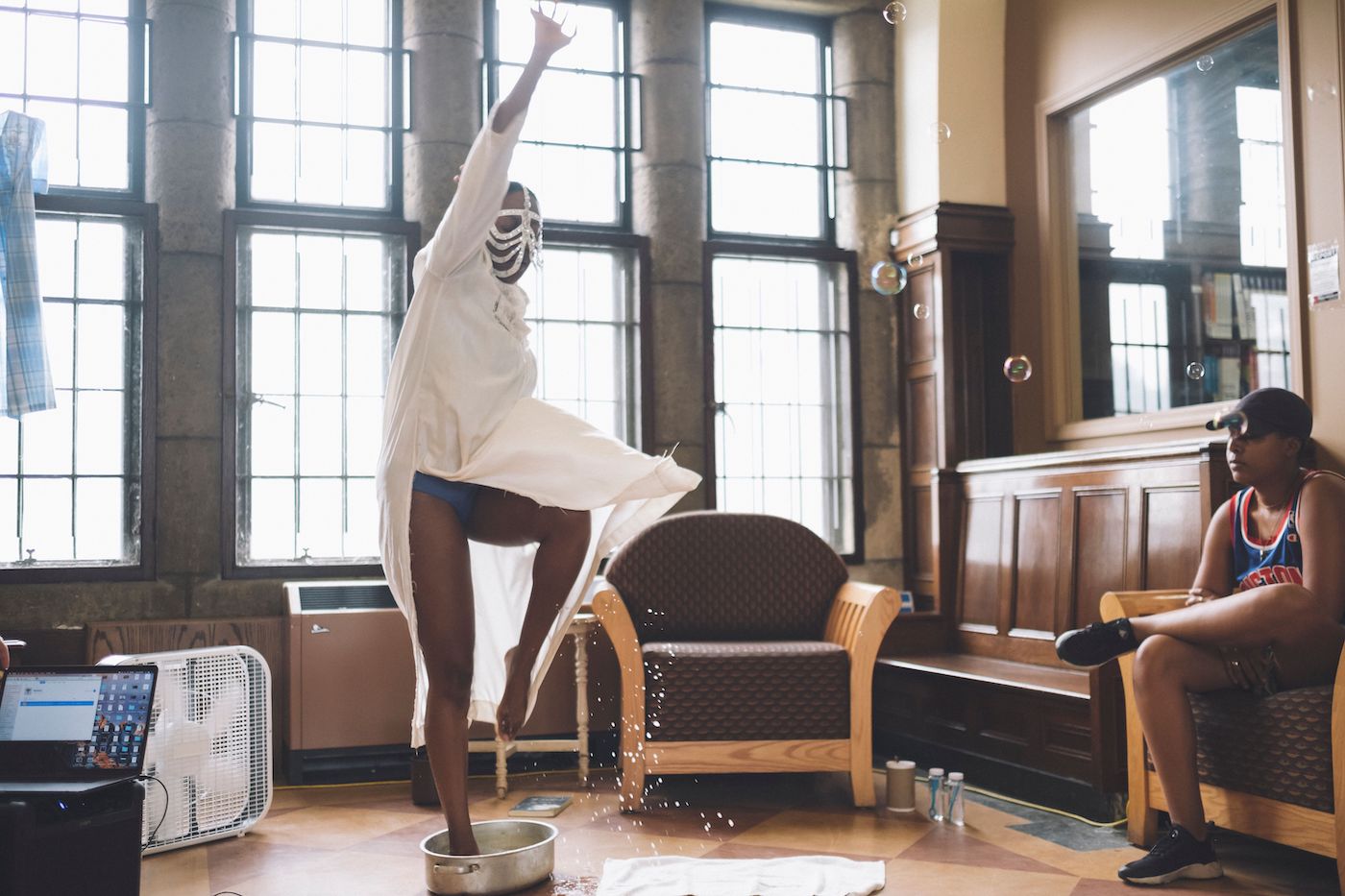Show Me Your Shelves! is a two-city exhibition featuring Black artists from Germany and the US. First in Detroit and then in Houston, the show brings together artists reflecting on common structures and experiences between German Afro-diasporic cultures and African American perspectives, as well as the differences. Jennifer Harge is a Detroit-based performance artist and director of Harge Dance Stories, a collective committed to Black vernacular gestures, codes, and rituals as a way of subverting traditional postmodern aesthetics. C& spoke to Harge about global liberatory practices, the power of movement language, and the home as a site for pleasure practicing and self-sovereignty.

Detroit movement artist Jennifer Harge engaged the Parkman Library through performative reading groups for youth and adults. Harge activated texts by authors Virginia Hamilton, Saidiyah Hartman, alexispauline gumbs, and Audre Lorde through group discussions and movementresponses.
Contemporary And: How can body language and dance tell powerful stories despite being a little bit abstract?
Jennifer Harge: The body is filled with histories and memories held in the flesh, the blood stream, the viscera, and I think the power of movement language comes from these energies. Either in the ways one might work through those blood memories, or how one might try to avoid them. I think it is in this relationship between our bodies histories and memories that the story is revealed. In my own practice, I’m always working to get real about the autobiography of my body: what am I carrying? who’s blood is in my blood? How do I reckon with this? And I find this physical investigation to be extremely communicative, even if it’s not completely legible. I work to consider who the dance story is for–myself? My family? Other black women? From this lens, illegibility is a way to keep “family business family business.” So what may be illegible to some may not be to others. I’m always interested in coding in this way.

Detroit movement artist Jennifer Harge engaged the Parkman Library through performative reading groups for youth and adults. Harge activated texts by authors Virginia Hamilton, Saidiyah Hartman, alexispauline gumbs, and Audre Lorde through group discussions and movementresponses.
C&: How does your body relate to the public in telling the story?
JH: I work to play close attention to who’s in the room. Most of my performances take place in extremely intimate settings, which gives me an opportunity to read the room. So in the Show Me Your Shelves show, for instance, there was one audience filled with children, so I played into the interactive fairy tale aspect of the piece. Or when the room is majority white, I will often the keep the deep Black femme interiority to myself as to not give too much away. In this instance my body works as an archive of refusal–not offering up the sacredness that is Blackness. But if I can feel and see that the room is Black, then I am moving through our gestures, codes, and rituals in ways only we can see. In these examples, It’s not that I’m shifting the scope of my work to appease audiences, but it is a way for us to have a conversation based on the themes I’m working inside of.
C&: How do you find your position as an artist within the global African Diaspora?
JH: I like to think that I’m in conversation with a global African Diaspora, with people thinking about liberatory practices, whether for visual art or movement art or whatever people’s disciplines are. I think there is this priority – and that there always has been this priority with Black artists across the Diaspora –to keep reinventing and reimagining what liberation looks like for our current time, our current ways of living, the sociality of that living. I am always trying to be in conversation with folks who are working along those lines, with that kind of material. So I take a lot of cues from global artists who think about what liberation could even mean. And I realize, being a person living in the US, I’ve already entered the space with lots of privileges – so I try to be mindful of that, and check myself.

Detroit movement artist Jennifer Harge engaged the Parkman Library through performative reading groups for youth and adults. Harge activated texts by authors Virginia Hamilton, Saidiyah Hartman, alexispauline gumbs, and Audre Lorde through group discussions and movementresponses.
C&: Could you tell me more about the work that you developed for Show Me Your Shelves! in Detroit?
JH: I’ve been working on a piece called FLY | DROWN, which is turning into a dance-folktale. I was thinking about the Black domestic space in the US post-Great Migration [which happened in the US between 1916 and 1970], and thinking about home spaces that have been crafted by Black folks in the north after escaping white terrorism. How did Black folks create homes in the wake of this? I was thinking of the ways in which Black women in particular have had to organize space, or demand that the home be a site for pleasure practicing, or self-sovereignty. And so the piece is a folktale in which we re-member what grandmothers and Black women have done to ensure those sites are our places of Black safety, by being honest about the labor involved in ensuring that. The work is intended to remind us of what that space has been, and to think about how we can use the home space as a model for knowing the pathways towards pleasure. How can I use the strategies my grandmother used in her home to organize my own routes toward self-sovereignty in my body?
Show Me Your Shelves! presented by C& took place in Detroit Public Library (Main, Skillman, Parkman), Detroit, United States, from 17 July 2019 to 18 August 2019. In Houston the exhibition will be open from 30 October until 26 November at Gregory School Library.
Jennifer Harge is the artistic director of Harge Dance Stories. She is a performer, art maker, and educator. Trained as a modern dancer, Harge’s work lies at the intersection of movement, performance art, African American culture, and choreographies of protest. Through her work with Harge Dance Stories and as a solo performer, Harge’s creative work has been presented at Washington National Cathedral, Pulitzer Arts Foundation, Detroit Institute of Arts, Museum of Contemporary Art Detroit, Music Hall Center for Performing Arts, Atlantic Center for the Arts, Dayton Contemporary Dance Company, University of Michigan, Duke University, and Wayne State University. Harge holds a MFA from University of Iowa as a Dean’s Graduate Fellow and a BFA from University of Michigan.
Interview by Will Furtado.
More Editorial